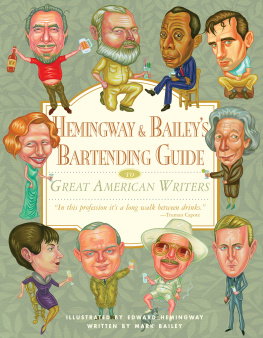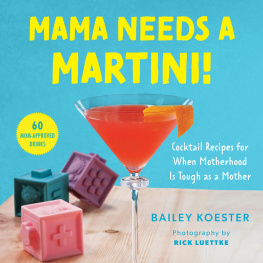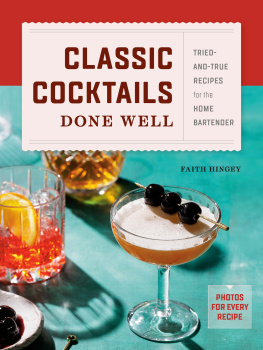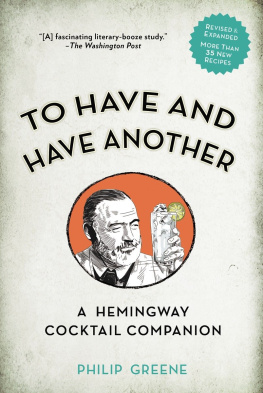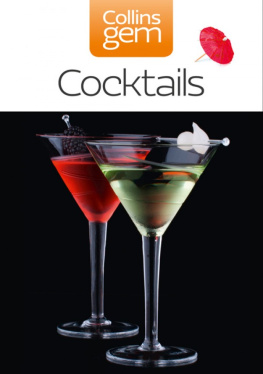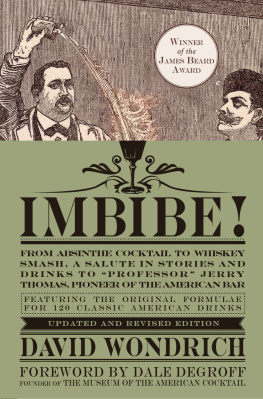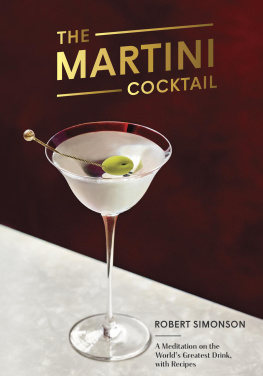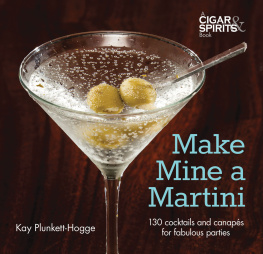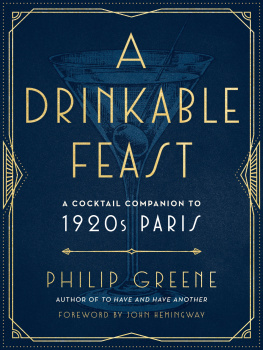HEMINGWAY & BAILEYS BARTENDING GUIDE
TO GREAT AMERICAN WRITERS

ILLUSTRATED BY EDWARD HEMINGWAY
WRITTEN BY MARK BAILEY
Algonquin Books of Chapel Hill
Published by
Algonquin Books of Chapel Hill
Post Office Box 2225
Chapel Hill, North Carolina 27515-2225
a division of
Workman Publishing
225 Varick Street
New York, New York 10014
Illustrations 2006 by Edward Hemingway.
Text 2006 by Mark Bailey.
All rights reserved.
Consulting Bartenders: Sam Ross and Toby Maloney.
Researchers: Peggy Gormley, Tim Mackin, and Emily Schlesinger.
Library of Congress Cataloging-in-Publication Data is available.
E-book ISBN 978-1-61620-215-6
It has been my experience that folks who have no vices have very few virtues. Abraham Lincoln
If I had to live my life over, Id live over a saloon. W. C. Fields
Contents

Introduction
This book grew out of a simple observation: writers like to drink. Not all writers, of course, but most. Or at least they used to. The writers in this book, for example, forty-three great men and women of American letters. From James Agee to Thomas Wolfe, the list includes five Nobel Laureates and fifteen Pulitzer Prize winners, not to mention the National Book Award winners, Academy Award winners, and just plain best-sellers. Its a whos who of our nations most accomplished novelists, short-story writers, poets, playwrights, journalists, and critics. And they all loved their liquor.
The two of us were talking about this one snowy night a few years ago. We were at a Christmas party in a bar in Greenwich Village, sitting on barstools drinking beers and feeling a touch nostalgic. The night had not started out that way. For any number of reasons (the cheer of the holiday season, the beauty of snow falling in New York, the pleasure of an open bar), we had been looking forward to a pretty serious bender. Yet to our surprise, the party was not with us. There we were, in a bar filled with writers, and the crowd could not have been more tame.
In the good old days, we imagined, things would have been very different. In the good old days, the myth of the hard-drinking writer was not just a myth. But clearly that world had disappeared long ago. Still, the stories remainedF. Scott and Zelda Fitzgerald showing up at parties in their pajamas, Ernest Hemingway busting John OHaras walking stick over his own head, John Steinbeck and Robert Benchley diving for wine bottles at the bottom of a pool. The drunken tales of wilder times. And, of course, the cocktails survived too, if barelythe Sidecar, the Stinger, the French 75like the language of a lost civilization. We ordered more beers. But wasnt that at least somethingthe stories, the cocktails? We took another sip. And wouldnt it be something greater still to travel back, even if only in spirit?
We decided to give it a try. One more round, but this time a Mojito, as Hemingway would have had it. And a Gin Rickey for Fitzgerald. We watched the bartender line up the glasses.
..........
In New York, Los Angeles, Paris, at places like the 21 Club, the Musso & Frank Grill, and the Ritz Hotel, classic writers drank classic cocktails. Some had clear favorites. Others were more fickle. What they shared, though, was a common thirst and a high regard for the well-made drink.
Through research, deduction, and a little imagination, we have tried to honor that with our own recipes. We have tested every cocktail in this booktested and re-tested. They are well-made drinks, true to the spirit of their day and, as important, delicious too.
When asked about writers and their affinity for alcohol, Truman Capote quoted Irish playwright Brendan Behan, We are drinkers with writing problems. It was a confession of sorts, that the scales had tipped for him. Maybe they tipped for other writers in this book too. Why did they drink so much? Did alcohol help or hurt their writing? These are worthwhile questions and there are no easy answers. But then this is, after all, a bartending guide, and who are we to say.
What we have done is to offer up some brief excerpts from their literary works. Tidbits from the novels and short stories, the plays and poems and articles that made these writers great. One thing is clear: however pickled these writers may have been, they left an extraordinary body of literature behind for us.
So lets lift the first glass to them, to these forty-three great men and women. It is our hope that through their drinks, their stories, their colorful faces, that you too will be able to travel backto the good old days. All we ask is that you be a little careful as you go. Remember, a couple of cocktails doesnt make you a drunk, and no amount of liquor can make you a writer.
Edward Hemingway & Mark Bailey
Tools of the Trade
UTENSILS

SIMPLE SYRUP
1 cup granulated sugar
1 cup water
(One-to-one ratio, as much as desired for use or storage.)
Stir 1 cup of granulated sugar and 1 cup of water in a saucepan over medium heat. Bring to a light boil and then let simmer until sugar is completely dissolved. remove pan from heat, and let cool.
If storing, pour cooled syrup into a glass bottle or jar, cap tightly, and refrigerate. Should keep for a week.
GLASSES
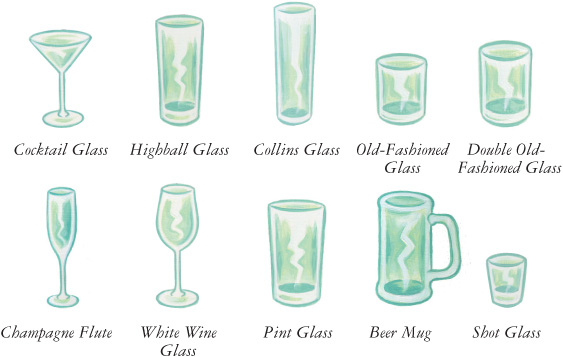
GARNISHES
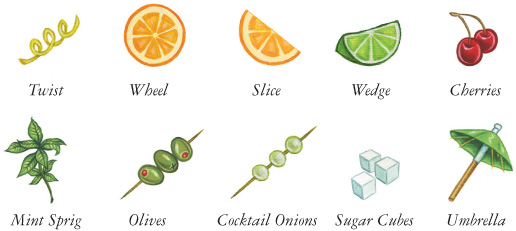
James Agee

After one drink its very hard not to take another, and after three it is even harder not to take three more.
Agee, often quiet and despairing when sober, was transformed by alcohol. The life of the party, no, but he could be terrifically entertaining. Director John Huston found that the more Agee drank the more he talked, and the funnier he got. A clever parodist, he liked to mime a piss-drunk Ulysses S. Grant accepting the sword from Robert E. Lee at Appomattox and sliding onto the floor. Although not an actor, Agee occasionally cast himself in bit roles. He played a drunk in both The Bride Comes to Yellow Sky and a television film on Abraham Lincoln. Clearly, he knew how to play to his strengths.
..........
19091955. Novelist, journalist, screenwriter, film critic, and poet. Let Us Now Praise Famous Men, poorly received at the time of publication, is Agees most celebrated work. His unfinished autobiographical novel, A Death in the Family, won the Pulitzer Prize. The African Queen, written with John Huston, was nominated for an Academy Award.
WHISKEY SOUR
Like many southern writers, Agee (born in Knoxville, Tennessee) loved his bourbon. One of Americas oldest cocktails, the venerable Whiskey Sour is a fine way to imbibe yours. When made just right, a balance between sweet and sour is achieved.

